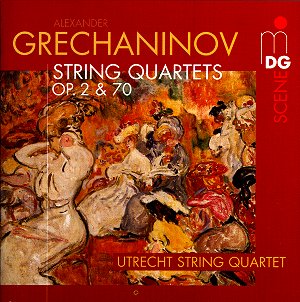As a chamber music lover, particularly of the string
quartet, I was pleased to be assigned this new release from MD&G.
This is all the more stimulating because the two quartets are
works that are relatively unknown yet of high quality. I found
them to be neglected gems of Russian chamber music. They are perhaps
better than most of the genre composed between the time of Tchaikovsky
through to that of Shostakovich. It is my understanding that Grechaninov
composed a further two string quartets and this release has left
me anxious to hear those, should the opportunity arise in the
future.
A pupil of Safonov, Arensky and Laroche at the Moscow Conservatoire,
Grechaninov was considered to be a rather mediocre student so
much so that Arensky advised him to pursue another career. When
Grechaninov moved up to the St. Petersburg Conservatoire
he began to exceed all expectations and showed remarkable progress
in composition under the tutelage of the master composer and teacher
Rimsky-Korsakov.
Grechaninov was to become a most prolific composer particularly
noted for his composition in the field of liturgical music where
he made some of the most significant contributions ever to Russian
religious music. In addition the composer's many songs that he
composed before 1900 are considered by many to be among the finest
by any Russian. Unfortunately Grechaninov's secular music has
not lasted in popularity and he has become rather unfashionable
classed as an eclectic composer of the old school. Perhaps this
disc of the first two of his four string quartets will help redress
the balance.
In the First String Quartet Op. 2 the opening Andante section
previews material to come later. The leisurely Allegro features
very lyrical and memorable Borodin-like melodies. Mixed with harmonies
that reveal the influence of Dvorák. This proves to be
an extremely attractive movement, confident and heroic like a
young man facing the world with optimism.
The second movement Andante displays the same man in a more reflective
mood. Brooding, the rich and dark harmonies cause momentary hesitation
before a wonderfully romantic 'love theme' at 1:55. The relaxed
mood persists, reminiscent of the ending of an era where such
indulgence was still possible.
Next is a traditional-sounding Scherzo bursting with energy with
the freshness of the opening movement returning. The trio section
may be a traditional Russian folk song or a passing suggestion
of one. However the transition back to the first section is a
bit uninspiring.
The initial unison opening to the Finale, of a Shostakovich-like
seriousness, is soon banished by a triumphant tremolo section.
Again Grechaninov's lyrical style is prominent, mixing well with
an almost 'Haydnesque' charm. After a Straussian 'conversation'
between first violin and cello the confident themes return to
bring an energetic conclusion.
The booklet notes claim that Grechaninov does not develop his
themes sufficiently. The writer may be right up to a point, as
the themes, though most attractive, are repeated with little variation.
Despite this minor criticism this is an exceptionally enjoyable
and rewarding string quartet.
In the later Second String Quartet Op. 70 immediately we notice
that the musical language is very different. Grechaninov's use
of spiky rhythms are particularly noticeable and reminded me a
little of his fellow countryman and close contemporary Stravinsky.
Overall there is an innate sentimentality but it is more opulent,
clothed in chromatic, yearning, impressionistic attire suggestive
of a Gustav Klimt painting.
There are also several echoes in the quartet of his exact contemporary
Strauss. However the dominant influence is that of another fellow
countryman, Scriabin. Grechaninov actually lived another 40 years
so how did he follow this style of writing? Most intriguing! Aged
75 he moved from Paris to the USA and lived another 17 years!
The opening Lento is certainly the superior movement in this
work with the remainder of the quartet being unable to match its
creative qualities. For Grechaninov this is clearly a giant leap
in maturity from the youthful Op. 2 quartet. The ending comes
upon us with no warning which is a surprise but somewhat disappointing
nevertheless.
The second movement Scherzo is unsettling with its jollity seeming
cynical and devilish. Clothed in lyrical phrases it attempts to
hide an undercurrent of unrest or mischief like a wolf in the
well known fairy tale.
The Largo commences with much promise. A Fugato section at 02:22
introduces an attractive contrast. Grechaninov's harmonies are
most ravishing but the material disappointingly begins to meander.
Throughout both these quartets I am struck by just how much the
composer seems so at home writing for this medium.
The Allegro finale seems to be modelled on Beethoven with a passing
reference to the opening of his Op.59 No.1 Quartet. Not only with
its classical rhythmical motion, but the modulations, pauses and
accompaniment employed in the quartet writing hark back to the
greatest writer of string quartets. Overall this is somewhat sombre
in mood and not as immediately appealing as the earlier work but
the listener is certainly rewarded with repeated plays.
The excellent Utrecht String Quartet perform these two rare and
attractive quartets from a fascinating and underrated composer
with real imagination and a strong commitment. Sterling performances
combined with a most appealing recorded sound quality make this
is an outstanding issue and the disc serves Grechaninov extremely
well. Required listening for all lovers of late-romantic music!
Michael Cookson

